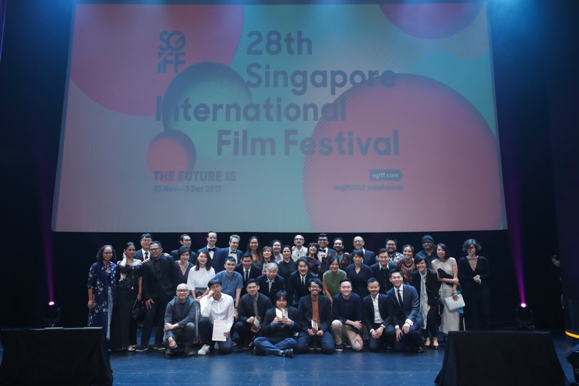SGIFF 2017 On the Ground • Closing Weekend (December 1-3)
The 28th edition of SGIFF concluded on Sunday, December 3, 2017. The night before, the festival’s Silver Screen Awards handed out accolades to an array of titles: Ali Asgari’s Iranian film Disappearance won big with awards for Best Asian Feature Film and Best Performance (for Sadaf Asgari); Malila: The Farewell Flower‘s Anucha Boonyawatana took home Best (Asian) Director. Meanwhile, Best Southeast Asian Short Film went to “Jodilerks Dela Cruz, Employee of the Month” by Filipino Carlo Francisco Manatad; Tan Wei Keong’s “Between Us Two” won Best Singapore Short; and Thai filmmaker Sorayos Prapapan was named Southeast Asian Best Director for “Death of the Sound Man.”
Sunday saw encore screenings of Luca Guadagnino’s Audience Award winner Call Me By Your Name, as well as Disappearance. Indonesian auteur Garin Nugroho, who accepted SGIFF’s Honorary Award Saturday, gave a masterclass, while Japanese acting veteran Koji Yakusho conducted a conversation… and with that, 11 busy days of festival-going came to an end. If you missed any of it, though, don’t worry—we didn’t. (Read our first and second recaps, too!)
In Conversation With: Philip Lee
Friday, December 1, 7 p.m., ArtScience Museum

SGIFF was graced by the appearance of veteran Hollywood producer Philip Lee for a masterclass. Involved in highly acclaimed works such as Alejandro G. Iñárritu’s bone-chilling neo-Western The Revenant and Christopher Nolan’s seminal The Dark Knight, Lee shared valuable insights from his long-spanning international career, in an inspiring afternoon for aspiring producers.
China is now the second-biggest box office in the world, displacing Japan. The producer revealed that China’s rise to prominence as a market has long been gestating in his mind since the late ’90s, where Lee had to act as the link between Hollywood and China for Ang Lee’s martial arts epic Crouching Tiger Hidden Dragon. “Respect. It’s all about respect. And communication,” the producer related, explaining candidly that filmmakers and production companies cannot expect to waltz into China and “insist on doing things their way.” Now that China has been established as a major revenue source for the Marvel and Transformers franchises, however, “there is more familiarity and we are working better together,” the veteran opined.
Lee also helped to finance the hugely ambitious Cloud Atlas, adapted from David Mitchell’s Man Booker-shortlisted novel of the same name. Directed by German maverick Tom Tykwer and the Wachowski siblings, Cloud Atlas is frequently touted as the most expensive indie film of all time. Lee said that the project had begun life with Warner Brothers agreeing to produce and finance the film to the tune of US$200 million, but then shifts in upper level management left the project on the backburner. Undeterred, Lee, along with his co-producers, eventually managed to secure a US$100 million-strong production budget for the film, drawn together from various sources in Europe. Lee said that his belief in the project was key to its successful financing; determination to take every meeting and chase down every possible lead for financing. “You have to find someone who shares the same vision as you,” he said. Regarding the film’s semi-spiritual subject matter, Lee shares a deep interest for reincarnation and rebirth, which was his impetus to produce Mitchell’s story; he “no longer takes projects that do not interest him as a favour to friends.”
In his closing words, Lee left the audience with a zinger when asked what his favourite project was. “My next one,” he quipped.
– Koh Zhi Hao
Shuttle Life
Friday, December 1, 7 p.m., National Museum of Singapore
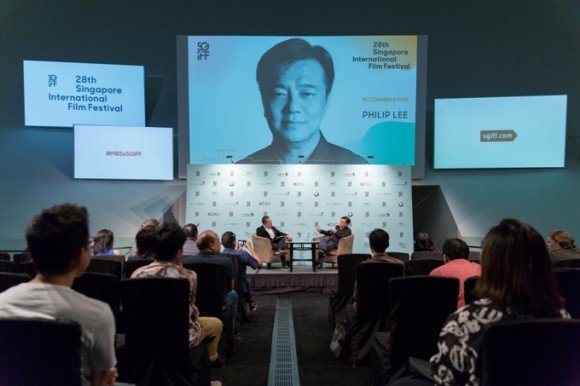
Shuttle Life is, despite its straightforward story, not an easy watch. Unlike many films that fall into the trap of romanticising the ‘enduring strength’ of marginalised people, Malaysian filmmaker Tan Seng Kiat is relentless in his depiction of the poverty cycle—as conveyed through the story of Qiang, a young man in Kuala Lumpur who has to care for both his 6-year-old sister and his mentally unstable mother. First-time feature director Tan makes it a point to demonstrate the cycles that lock the urban poor into their situations. As Tan shared with us after the screening, it is precisely for this that Shuttle Life got its Chinese title: fen bei (分贝) is a deconstruction of the word pin (贫), meaning ‘poor’ in Mandarin, while ren sheng (人生) means ‘life’.
Despite the film’s bleak themes, the post-show Q&A, also attended by producer Jin Ong and actor Jack Tan (who plays Qiang), was one of the most enjoyable sessions I had at the festival. The easy camaraderie between the three guests made the session feel like a casual dinner conversation. Director Tan revealed the significant changes the story went through after Ong approached him with the original outline, which he felt was clichéd. “The original story took place over a year and a half, featuring many small characters in different families. We changed it to a story of Qiang that unfolds over two days. I believe that when people are trapped in a situation and forced to react, it can reflect the skills and backstory of their lives.”
Jack Tan (half of the Malaysian musical duo ThomasJack, and a newcomer to acting) recounted working with veteran Taiwanese actress-director Sylvia Chang, who plays Qiang’s mother. “I definitely felt stressed and nervous, but Sylvia was very willing to share about her experiences. On the first day, I asked her if there was anything we could do to enhance our on-screen chemistry. She told me not to worry because sometimes, unexpected performances can bring surprising effects.”
– Kathy Poh
Southeast Asian Short Film Competition: Programme 1
Friday, December 1, 7 p.m., National Gallery Singapore
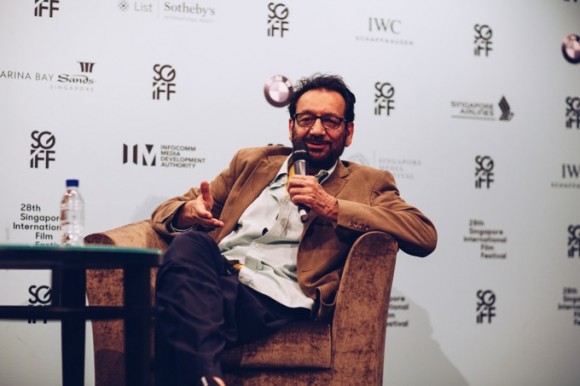
The Southeast Asian Short Films, divided into three programmes, are a chance for festival-goers to watch some of the most exciting developments in film from the region. The short films are also in competition for various prizes, and as such serve as a platform to find the next big name in Southeast Asian filmmaking: Many of the filmmakers from past selections have gone on to make award-winning feature films.
Programme One set a rather sombre mood with the screening of SGIFF’s commissioned short film, “Nyi Ma Lay” by Chiang Wei Liang (whose short film “Anchorage Prohibited” won Best Singapore Short Film at SGIFF last year). A slow contemplation of life and death from the perspective of a Burmese helper, this film communicated pain and helplessness with an effortless simplicity.
Also included here were two films that won at the Silver Screen awards on Saturday evening. Curiously, both films were sparked by chance moments in the filmmakers’ lives. “The Malediction”, by Makbul Mubarak, received a Special Mention from the SGIFF jury. Focusing on a polygamous man who treads a very thin line between religious duty and self-fulfilment, Mubarak said this film was inspired by a time he caught his father eyeing another woman—though the filmmaker was quick to reassure the audience that his father is nothing like his film’s protagonist! Carlo Francisco Manatad’s film “Jodilerks Dela Cruz, Employee of the Month”, on the other hand, was sparked by a journey Manatad took to an ancestral location, only to discover that it had been turned into a gas station. His anger as a response to this loss resulted in an explosive punk-rock experience Manatad called a ‘YOLO film’. This film won him the Best Southeast Asian Short Film award.
Along with these two films, the three other shorts (“Kampung Tapir”, “Song X” and “Five Trees”) were all worthy examples of why our stories matter, and why our filmmakers must continue to push boundaries to best express them.
– Tanvi Rajvanshi
Scary Mother
Friday, December 1, 9:30 p.m., National Museum of Singapore
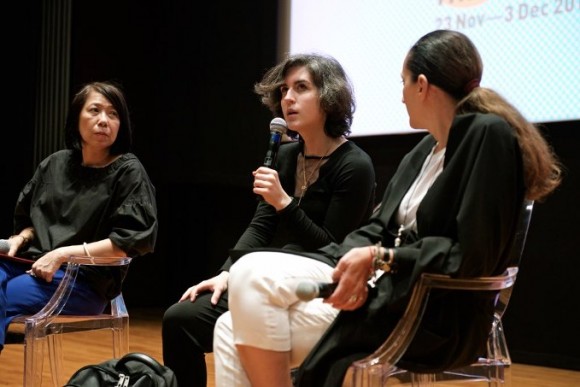
Winning Best First Feature at Locarno Film Festival and top honours at Sarajevo Film Festival this year, Scary Mother is an assured debut feature from Georgian filmmaker Ana Urushadze. The film is a taut psychodrama of Lynchian proportions, underpinned by an irrepressible central performance from Nato Murvanidze as housewife Manana. Channelling her best impression of Isabelle Huppert, the actor’s performance is elusive; twisting and turning at the drop of a pin, she is at once wounded, adrift and ravenous. Supported by Ramaz Ioseliani, who plays oddball loyalist and ‘editor’ Nukri, and Avtandil Makharadze, who plays her raspy, distant father, the film features a terrific suite of performances—the director’s young age (27) belying her adroitness at drawing greatness out of her actors.
Set in the stark austere Georgian capital of Tbilisi, hard lines and gunmetal greys imbue the film with a sense of Kafkian bleakness. The mould of drab colouring is broken when Manana moves into the backroom of Nukri’s shop in order to get away from her family. Recalling the red of Bergman’s Cries and Whispers, the red room is a womb of Woolfian proportions that envelops Manana like a cocoon as she begins a degeneration into the Manananggal, a beast from Filipino yore that is half human, half bird. The film maintains a critical detached cool, keeping viewers at arms’ length as Manana tumbles headlong into the ravines and caverns of her psyche, culminating in a shocking confrontation where deep-seated family history and trauma is carelessly unfurled over tea.
The Q&A with the director was brief. She expressed her pride and excitement over the nascent new wave of young Georgian filmmakers, who are slowly growing in international prominence. On her working relationship with Murvanidze, Urushadze revealed that the pair had extensive sessions before principle photography, during which they worked out the nuance and depth of Manana, but that the veteran actor took the reins once filming begun. Her performance, the director said, only came into full view once the film had been completed and assembled.
– K.Z.H.
Masterclass: Shekhar Kapur
Saturday, December 3, 2 p.m., ArtScience Museum
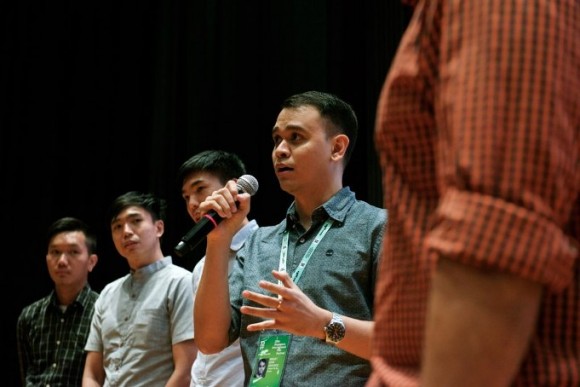
An enthusiastic full-house crowd turned out to watch Indian filmmaker Shekhar Kapur (who also headed SGIFF’s Asian Feature Film Competition jury this year) discuss his 40-plus-year career in a masterclass on Saturday afternoon. The hour-long discussion began with clips from some highlights of Kapur’s oeuvre: his 1994 breakout film Bandit Queen; his 1998 Best Picture nominee Elizabeth and its 2007 sequel Elizabeth: The Golden Age; and his latest endeavor, the Shakespeare-centered TNT series Will.
Kapur recalled the controversy that dogged a couple of those queenly titles. He was sued over Bandit Queen, a loose biopic of Indian bandit and Member of Parliament Phoolan Devi, who hotly contested the film’s accuracy; the film was banned temporarily in the country. “It was made to make people angry,” Kapur reflected now—and indeed, when it did play, audiences showed up “by the busloads.” Meanwhile, for Elizabeth, about the rise of Britain’s so-called ‘virgin queen’ (portrayed memorably by Cate Blanchett), Kapur drew flack for depicting Queen Elizabeth I with a lover. He had been interested, he explained, in the societal impulse to “deny [female rulers’] sexuality; whereas men are able to assert their sexuality, their power—look at Trump.” On the whole, Kapur’s favored film subjects are strong women—female stories, he posited, offer “much greater subtext; a chance to get into the psyche,” whereas cinematic examinations of male power tend towards the violent and action-oriented.
The director spoke almost religiously about chaos, and its impact on creativity. Though an overplanner during prep, Kapur ironically is the opposite on set: “Until something goes wrong, you don’t know what that moment is asking you to do.” Even on big-budget productions, he might wait until the last moment to decide on how to shoot a scene, sometimes asking his actors on the spot for their suggestions. “I push actors so fast that I don’t have time to think… more often than not, it works.”
Interestingly, when an audience member asked Kapur to recommend film schools or filmmaking books, Kapur revealed that he had just, at the age of 71, discovered that he was dyslexic—so his lifelong facility with “visual language,” he concluded, was “compensation for dyslexia.” As for schools, Kapur—who studied economics and started his career as an accountant—admitted that he isn’t a fan, as many institutions place too much emphasis on technique over content. His best advice to directing students, then? “Go live in a slum for a year and observe”—a life experience that, he suggested, would be more valuable to an artist than any formal education.
– Kelly Leow
I Want to Go Home
Saturday, December 2, 4:30 p.m., National Museum of Singapore
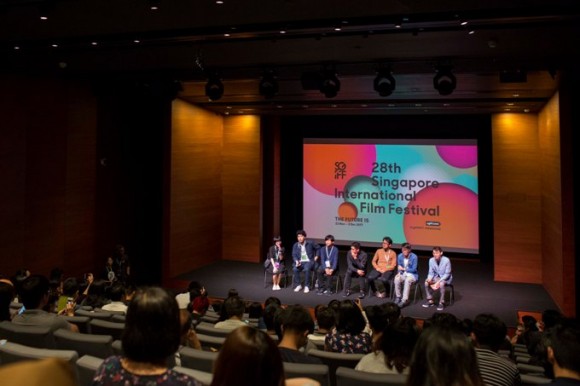
It happens every week. Every week, Mr. Yasuo Takamatsu and his diving equipment are back into the waters of Onagawa bay.
“I want to go home.”
These words, sent from the pink flip phone of Yuko Takamatsu, Mr Takamatsu’s late wife, carry Mr Takamatsu on his ritual. Time and again, he ventures out into the pale blue sea to search for Yuko—who was taken away from him and his family by the ruthless Japanese tsunamis of March 11, 2011—to bring her back home.
In his debut documentary, Singaporean director Wesley Leon Aroozoo takes us to a place no one wants to be: a prefecture wounded by nature, a home in perpetual ache for its missing mother, a weekly shuttle between search and despair, and a sorrowful solitude. Takamatsu shares his stories calmly, barely a hitch in his voice. Little by little, he dusts the years off framed memories, recalls fondly the bitter blackness of her coffee, and walks us through where fierce waters hit concrete. The film ebbs and flows; his sorrow reverberates through the theatre, finding its way into our hearts.
Takamatsu has been diving for years. Now, his approach has perhaps shifted a little closer to acceptance. In the Q&A session, Aroozoo talked about Takamatsu’s answer to the question, “Why do you continue to dive?”
“I dive because that is the only way to be close to my wife.”
Water has always made what we see appear closer to us. Today, Onagawa Bay closes the distance—as if out of some responsibility—to become the only place Takamatsu can be close to Yuko.
– Priscilla Alexandrea
Masterclass: Garin Nugroho
Sunday, December 3, 11 a.m., National Museum of Singapore

An influential artist and community leader who uses his art to capture the nuances of Javanese culture and state of his nation, Indonesian filmmaker Garin Nugroho was accorded the festival’s Honorary Award this year for his contributions to Asian cinema. While his masterclass began with little fanfare on a quiet Sunday morning in the National Museum, it was nothing short of inspiring. In his discussion about filmmaking, theatre and art, Nugroho made me look at film in a way that I never have before.
“My style of working is nasi campur [mixed rice]. In nasi campur you can start from everything—rice can come first, or the meat first; it doesn’t matter.”
In his work, Nugroho deviates from the three-act structure conventional to Western cinema. In doing so, he recognises the improvisional nature of many Javanese oral and performative storytelling traditions, such as the Wayang orang dance drama. Citing examples from his own work on a meticulously prepared slideshow, Nugroho also went into further detail about how he adapts his stories to local cultures and geography. This can also be seen in the films he has written for other directors, such as Mouly Surya’s Marlina The Murderer in Four Acts, which had two sold-out screenings at the festival this year.
In a time where mass media and urban life tend to be oversaturated with ideas from the West, Nugroho’s approach to art offers us a way in which we may hold on to our own Southeast Asian culture. His presentation concluded with a salient line: “Filmmaking is preserving thoughts and beliefs. Thus the beliefs and thoughts are like the roots of the tree, and it will seek its own water.”
– K.P.
The 28th Singapore International Film Festival ran November 23 to December 3, 2017.


